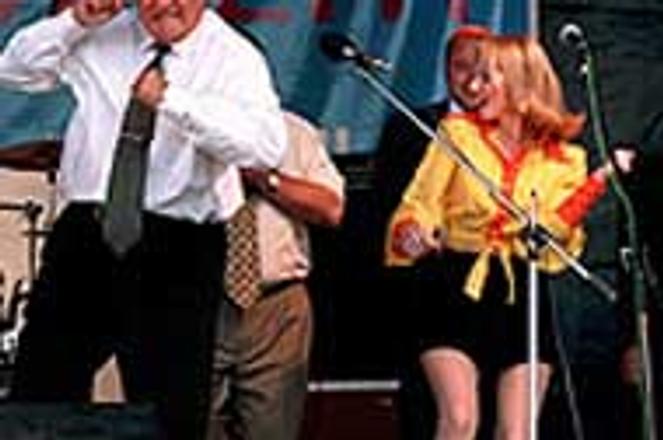The jovial Yeltsin was a big booster of Vladimír Mečiar's Slovakia.photo: TASR
Russian President Boris Yeltsin stunned the world on December 31 by announcing his resignation and asking the Russian people to forgive him for not fulfilling their hopes. As Yeltsin's presidential powers devolved to Prime Minister Vladimir Putin, many foreign governments scrambled to assess how the sudden change in power would affect their relations with Russia.
In Slovakia, government officials maintained that their dealings with the former superpower would remain unchanged. The Slovak government in co-ordination with Foreign Ministry released a terse statement on December 31 saying that Slovakia "reaffirms its interest in the positive development of relations with the Russian Federation, especially in the economic area."
Given the traditionally strong Russian influence on Slovak foreign policy, however, many diplomatic professionals called for a deeper analysis of how Yeltsin's replacement by Putin would affect Slovakia.
According to Ivo Samson, an analyst working with the Slovak Foreign Policy Association, recent developments in Russia were irrelevant for Slovakia if the latter remained on its pro-integration track. But if Putin's rise saw a return to a more aggressive Russian foreign policy, he said, the West might have reason to accelerate Slovakia's intergration pace. "The worst-case scenario of Russian developments, including a renewal of imperialism, would paradoxically improve Slovakia's attractiveness in Western eyes," Samson said, without commenting if such a scenario might occur under Putin's leadership.
Peter Júza, the secretary of the Parliamentary Committee on Foreign Affairs, also said he saw some possible advantages for Slovakia in current developments in Russia. "With Yeltsin gone, there is now more room for younger politicians. Younger usually means more progressive and more realistic," Júza said.
But other foreign policy experts felt the Yeltsin resignation would bring little if any good for Slovakia. František Šebej, chairman of the Parliamentary Committee on European Integration, said he had been "very surprised" by Yeltsin's resignation. "But I wouldn't call it a dramatic change," he said. "Putin is a representative of power circles, and maybe he will act in a more confrontational way towards the West. Within Slovak foreign policy, we don't feel any Russian influence in the area of EU integration. It's different with NATO, but at this stage Russia can't damage our objective to become a NATO member."
Another source from the Slovak parliament, who preferred to remain anonymous, said there should be no immediate changes in Russian policy towards Slovakia. "I would say our relations with Russia are now frozen," said the source, who has had diplomatic experience representing Slovakia in Russia. "Relations are determined by fact that Slovakia fully depends on oil and gas supplies from Russia. We can't change this fact, so we co-operate. But in the area of political relations nothing is happening at the moment."
Russian element in Slovak politics
Since the fall of communism in 1989, Slovakia has been one of the only central and eastern European countries to maintain close ties with Russia, particularly during the 1994 to 1998 government of Vladimír Mečiar.
A high-level source at the Slovak Foreign Ministry told The Slovak Spectator on January 4 that Russia had used Slovakia's energy dependence on the former Soviet country to virtually pull Slovakia out of the western integration mainstream, with the compliance of the Mečiar government.
"Russian Ambassador Sergej Yastržemsky, who worked here from 1994 to 1996, did a particularly good job for Russia, but one quite damaging for the current Slovak government," the source said. "Through economic tools, he managed to pull Slovakia out of the European integration mainstream. Slovakia's exclusion from the first group of integration aspirants by the EU and NATO wasn't the result of a lack of democracy, but of a clash between Western and Russian economic monopolies. And the Slovak [Mečiar] government allowed the Russians to win."
The Russian elite made no secret of its approval of the Mečiar government, with Yeltsin issuing a public statement in support of Mečiar's re-election drive in August, 1998. Following the victory of the pro-western Slovak opposition in September, 1998 however, relations with Russia have cooled dramatically.
In early 1999, the Dzurinda government refused to honour a signed contract to purchase a Russian S-300 anti-aircraft missile system. Russia, for its part, has virtually abandoned repayment of its Soviet-era debt to Slovakia, and is offering to repay only $40 million in the year 2000 instead of the $200 million expected by the Slovaks.
According to Šebej, relations with Russia were likely to continue cool under Putin. "This [debt repayment] is a Russian problem, not one of politicians in the Kremlin," he said. "Yeltsin's resignation has no impact on this financial issue. Russia had no money under Yeltsin, and won't have any under Putin either."


